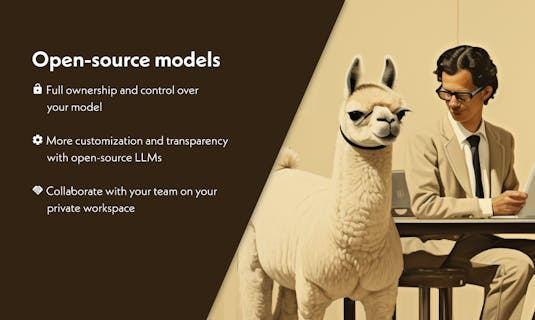Revolutionizing AI Applications with Gradient AI
TL;DRGradient AI has never been more accessible, offering cutting-edge features like fine-tuning large language models (LLMs) and integrating private AI applications seamlessly. This innovative tool makes it easy to customize models for specific use cases, eliminating the need for infrastructure and deployment headaches. With its powerful OSS capabilities and amazing storytelling and reasoning abilities, Gradient AI is a game-changer for internal automation systems. Whether you're looking to enhance quota attainment, lead flow, or overall compensation, Gradient AI provides insights and tools that can significantly boost your performance. Discover how this powerful AI tool can transform your approach to AI applications with its SOC2-compliant solutions and user-friendly developer platform.
2023-08-14
Transforming Insurance Operations with Gradient AI
At the heart of Gradient AI lies a powerful suite of features designed to transform insurance operations. This cutting-edge tool streamlines processes, enhances risk assessment capabilities, and empowers users to achieve significant improvements in efficiency and profitability. One of the key strengths of Gradient AI is its ability to integrate extensive industry data and AI expertise. This combination allows for accurate policy pricing, proactive identification of at-risk claims, and reduced claim durations. By leveraging Gradient AI, insurance companies can gain a more comprehensive understanding of risk and probability, leading to better decision-making and enhanced underwriting capabilities. To provide a more detailed understanding, here are 8 key features that make Gradient AI an indispensable asset for the insurance industry:
Gradient AI's solution identifies drivers of claims costs, predicts outcomes, and provides guidance for reserve-setting, enhancing risk assessment capabilities and reducing turnaround times.
The tool leverages a rich, wide, and deep industry data lake, providing extensive AI and insurance expertise to improve policy pricing and claims operations.
With a simple web API, users can fine-tune their LLMs and receive completions without requiring infrastructure, ensuring seamless integration and customization for specific use cases.
Gradient AI offers SOC2-compliant private AI applications, ensuring the highest standards of security and compliance for internal automation systems.
The tool provides a more complete and in-depth picture of risk, enhancing underwriting capabilities and reducing the combined loss and expense ratios.
By taking proactive action on at-risk claims, Gradient AI helps reduce costs and duration, improving overall claims operations and profitability.
The AI tool boasts highly generalized capabilities, including amazing storytelling and reasoning, making it suitable for a wide range of applications and tasks.
The developer platform allows users to select base models, define data, and customize models for specific use cases, making it easy to create private AI applications.

- Easy Integration with Applications via Simple Web API
- No Infrastructure Required for Deployment
- Customizable Models for Specific Use Cases
- Highly Generalized Capabilities with Strong Storytelling and Reasoning
- SOC2-Compliant Private AI Applications
- Lack of Context Handling at Large Scales
- Mixed User Reviews on Performance
- Tokenization Issues with Large Context Models
- High Resource Requirements for Testing and Experimentation
- Potential Overreliance on Specific Tasks like the Needle Test
Pricing
Gradient AI offers a subscription-based pricing model with three tiers Starter, Growth, and Enterprise. The Starter plan starts at $299/month, paid annually, and includes 24,000 credits, unlimited admin users, AI Account Researcher, Market Map, and Lookalikes. The Growth plan, priced at $799/month, adds 10,000 dynamic accounts, 10 rep users, dynamic territories with Bookbuilder, lead and account routing, and rep coaching with account engagement analytics. The Enterprise plan is custom-priced annually and includes up to 2 million credits, up to 1 million dynamic accounts, up to 1,000 rep users, managed AI Researchers for complex use cases, custom workflow implementation, and premium customer support, including a shared Slack channel.
Subscription
TL;DR
Because you have little time, here's the mega short summary of this tool.Gradient AI offers a versatile AI toolset for fine-tuning LLMs, providing instant customization and integration capabilities without the need for infrastructure. Its platform supports private AI applications compliant with SOC2 standards, boasting powerful OSS capabilities in storytelling and reasoning, making it a strong choice for internal automation systems.
FAQ
Gradient AI offers a range of features including fine-tuning large language models (LLMs), integrating private AI applications, and providing instant completions through a simple web API. It also ensures compliance with SOC2 standards and allows for customization of models for specific use cases without requiring infrastructure. This makes it an ideal tool for internal automation systems, enhancing storytelling and reasoning capabilities.
Gradient AI improves risk assessment by leveraging industry-leading AI and vast health datasets. It identifies drivers of claims costs, predicts outcomes, and provides guidance for reserve-setting. This results in more accurate policy pricing, reduced claim duration, and proactive action on at-risk claims, ultimately reducing cost and duration.
Using Gradient AI for insurance underwriting offers several benefits, including enhanced underwriting capabilities, a decrease in combined loss ratio and expense ratio, and an increase in Direct Written Premium per Employee. It also reduces quote turnaround time, providing a more complete and in-depth picture of risk.
Some users have reported mixed results with Gradient AI models when pushed to their full context size. However, artificially limiting the input to 32k tokens may provide better performance with the 262k version, as it has been expanded less. More testing is needed to determine the optimal model for specific use cases.
Gradient AI offers a developer platform that makes it easy to customize models for your specific use case. You can select the base model, define the data to teach, and then integrate private LLMs with your applications using a single API. This eliminates deployment, orchestration, and infrastructure headaches, allowing for seamless integration.


 Skip to content
Skip to content












How would you rate Gradient AI?